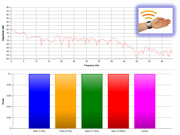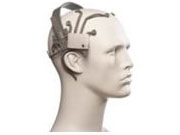
Apr
A common, popular conception of market research consists of women trying on lipstick in a small room with a two-way mirror, a la Mad Men. It’s amazing to think that in ten years this image may be drastically altered, most likely replaced by one of people browsing grocery store aisles with an EEG band strapped to their heads (Quite possibly, this EEG band actually will be part of a virtual reality machine digitally simulating the supermarket, but that’s a discussion for another day).
Neuroscience in marketing, or neuromarketing, is becoming essential for cutting edge market research. An expensive EEG machine is not always standard; rather, neuroscience can be applied to a technique as straightforward as surveying. Other methods of neuromarketing include: biometrics, eye tracking, facial coding, fMRI and implicit association, among other approaches. These techniques are used to gauge the subconscious side of decision-making—how information can affect one’s emotional responses, learning, and changes in attention and how these internal changes in turn affect concrete actions. For example, when trying to better understand what people feel about brands, implicit association measurement can be used to gather if a product’s branding induces feelings of trust or anxiety.
The novelty of including neuroscience in market research is exciting and truly futuristic. So, is neuromarketing the way of the future for market research?
Prefrontal.org author, Craig Bennett, discusses some flaws in neuromarketing and its perception in his 2011 article, “The Seven Sins of Neuromarketing.” In the article he outlines an inherent lack of academic rigor in neuromarketing science, claiming that the dominance of private industry over academia in the field can lead to questionable statistical analysis, reliance on press releases as opposed to peer reviewed information, lack of peer reviewed data, and false pretenses about objectivity, among other points.
However, while Bennett’s argument is valid, I do not worry for the future of neuromarketing. Rather, I continue to believe that it will indeed become a dominant popular image someday. The issues with neuromarketing are not necessarily about whether the methodology works, per se (that’s a completely subjective area), but rather deals with quality control and lack of critical thinking. Neuromarketing is a relatively new field, and its quality control will only improve as it’s taken more seriously and becomes more widely employed. With neuromarketing, a new world is open to market researchers, one that sees motives and impulses in an area that deals just as much with emotion as it does rationality. Strengthening neuromarketing’s legitimacy is really in the best interest of brands, and I gaurantee that someday it’ll be strange to consider market research without it.








